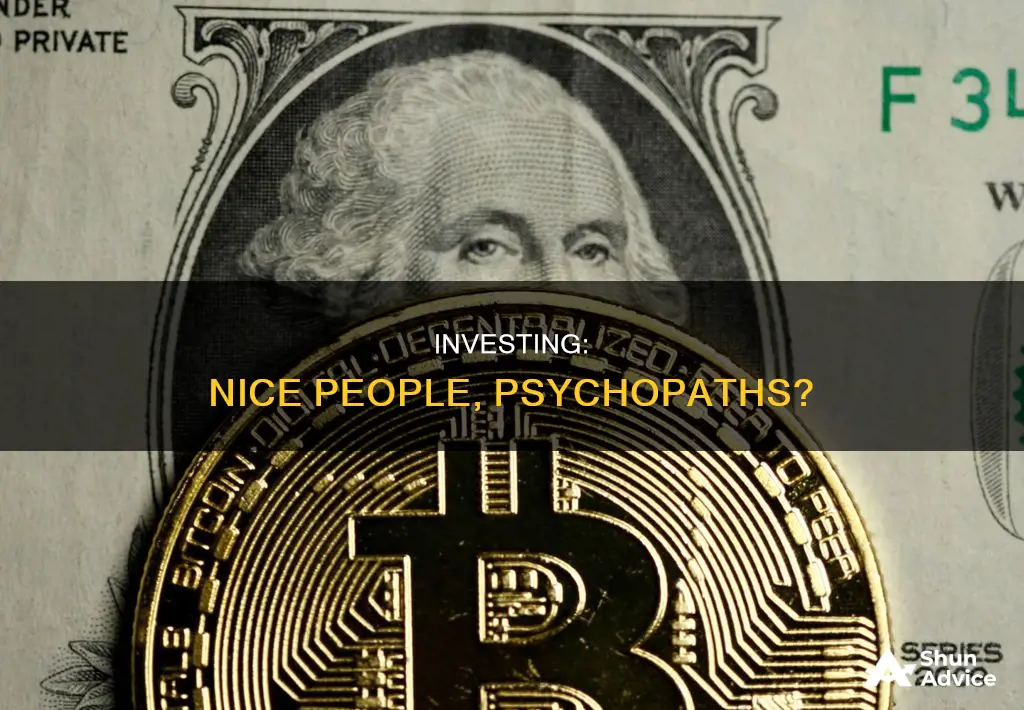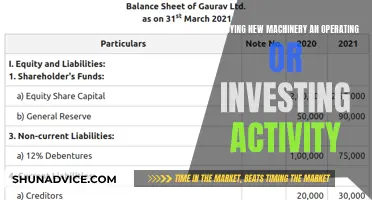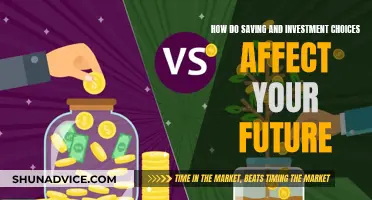
In her article 'How Investing Turns Nice People Into Psychopaths', Lynn Stout challenges the dominant business paradigm of maximising shareholder value. She argues that the homo economicus model of purely selfish behaviour is flawed and that most people are, to some degree, prosocial. While people are generally willing to make small sacrifices to follow their conscience and help others, the structure of modern stock markets and the rhetoric of shareholder value create obstacles to prosocial investing behaviour. As a result, even those who donate to charitable causes may simultaneously hold shares in companies that engage in environmentally destructive practices. Stout suggests that this disconnect between personal values and investment decisions is due to a lack of knowledge about a company's day-to-day operations and the collective action problem inherent in the current system.
| Characteristics | Values |
|---|---|
| Corporations encourage people to act anti-socially | N/A |
| Shareholder-value dogma | N/A |
| Homo economicus theory | N/A |
| Prosociality is endemic | N/A |
| Collective action problem | N/A |
| Jekyll-Hyde Syndrome | N/A |
| Maximise shareholder value rhetoric | N/A |
| Psychopathy is not natural or inevitable | N/A |
What You'll Learn

The homo economicus theory is flawed
The homo economicus theory is a cornerstone of neoclassical economics, particularly in microeconomics. It is a theoretical abstraction used to describe a rational human being. However, this theory is flawed due to several reasons. Firstly, it assumes that humans are rational decision-makers, but in reality, humans are flawed and often make irrational decisions, sometimes against their own interests. These irrational decisions can be impulsive, risky, or fail to consider long-term consequences.
Secondly, the homo economicus theory assumes that individuals are always self-interested and aim to maximize their utility or profit. However, humans are not always self-interested and may make decisions that benefit others or society as a whole. This is known as "prosocial behavior," which includes altruism, ethical action, and even vengeful punishment of antisocial behavior.
Thirdly, the theory assumes that individuals have perfect access to information, but in reality, people often make decisions with insufficient knowledge and processing capability. They may also be influenced by social cues, such as social norms and expectations, which can impact their behavior.
Additionally, the homo economicus theory assumes that individuals have unlimited cognitive capacity and can process any amount of information. However, this assumption is unrealistic as people have limited cognitive resources and can be affected by factors such as cognitive biases and time constraints.
Furthermore, the theory assumes that individuals' preferences and goals remain constant over time. However, in reality, preferences and goals can change, often in response to the context in which a decision is being made.
Finally, the homo economicus theory does not account for the complex ethical and behavioral dimensions of human decision-making. It portrays individuals as narrowly defined, money-making animals, ignoring other aspects of human nature, such as cooperation, reciprocity, and social roles.
In conclusion, the homo economicus theory is flawed because it assumes that humans are rational, self-interested, and have perfect access to information and unlimited cognitive capacity. However, these assumptions are not supported by scientific evidence, and the theory fails to capture the complexity of human behavior and decision-making.
Investing: Nice People Turn Nasty
You may want to see also

Most people are prosocial
Research has shown that prosocial behaviour is contagious, with people more likely to act prosocially when they see others doing so. This is supported by evolutionary science, which shows that prosocial behaviour is passed down through generations. In addition, prosocial behaviour is fundamental to the well-being of social groups, including schools and workplaces. For example, prosocial behaviour in the classroom can have a significant impact on a student's motivation for learning and their contributions to the classroom and the wider community.
There are several factors that influence prosocial behaviour. Firstly, it is mediated by situational and individual factors. For example, the presence of other bystanders can decrease an individual's likelihood of helping. This is known as the bystander effect. Other factors include the personal cost of acting prosocially, with people more likely to act prosocially when it is low-cost and less likely when the cost is high.
Prosocial behaviour also has a positive impact on the individual performing the action. Research has shown that people who engage in prosocial behaviours are more likely to experience better moods and less likely to experience negative moods. Additionally, prosocial behaviour can help mitigate the negative emotional effects of stress and reduce the risk of loneliness, alcohol use, and depression.
Why People Avoid Investing
You may want to see also

The rise of socially responsible investment funds
Socially responsible investing (SRI) is an investment strategy that seeks to balance financial return with ethical, social, and environmental goals. The concept of SRI is not new, with roots tracing back to the Religious Society of Friends (Quakers) in 1758, who prohibited members from participating in the slave trade. However, it has gained significant traction in recent years, with a growing number of investors seeking to align their investments with their moral principles and values.
History and Evolution of SRI
The modern era of SRI evolved during the socio-political climate of the 1960s, with investors addressing issues such as women's rights, civil rights, and labour issues. Economic development projects led by Martin Luther King Jr., such as the Montgomery bus boycott and the Operation Breadbasket Project in Chicago, established an early model for SRI efforts.
Key Features of SRI
SRI involves investing in companies and funds that have positive social impacts and avoiding those with negative social effects, such as alcohol, tobacco, gambling, and weapons production. SRI funds tend to focus on areas such as consumer protection, human rights, and environmental sustainability.
Growth and Popularity of SRI
The popularity of SRI has been increasing, with investors demanding more environmentally and socially conscious investment options. By 2010, 12% of all professionally managed assets were managed by SRI funds, and this number has continued to grow. According to a 2022 study, nearly 9 out of 10 investors cared about deploying socially responsible strategies when planning for retirement.
Benefits and Challenges of SRI
SRI offers a way for investors to balance their financial goals with their values and concerns for the future of the planet. However, one of the challenges of SRI is the potential trade-off between financial returns and social impact. While some studies find that SRI funds may slightly underperform other funds, most studies suggest that SRI investing only erodes returns slightly, if at all.
Examples of SRI Funds
There are various SRI funds available for investors, including mutual funds and exchange-traded funds (ETFs). Some examples of SRI funds include:
- IShares ESG Aware MSCI USA ETF (ESGU)
- IShares Global Clean Energy ETF (ICLN)
- Putnam Sustainable Leaders (PNOPX)
- TIAA-CREF Social Choice Equity (TICRX)
- Parnassus Mid Cap Fund (PARMX)
- IShares ESG Aware MSCI EAFE ETF (ESGD)
- Invesco Solar ETF (TAN)
In conclusion, the rise of socially responsible investment funds reflects a growing trend of investors seeking to align their investments with their values. SRI offers a way to promote positive social and environmental impacts while still pursuing financial gains. While there are challenges and considerations, the increasing demand for SRI options indicates a shift towards more conscious and responsible investing practices.
Bankers: Social Butterflies or Lone Wolves?
You may want to see also

The Jekyll-Hyde syndrome
In her work, Lynn Stout, a Distinguished Professor of Corporate and Business Law at Cornell Law School, explores the idea that the homo economicus model of rational and purely selfish action is not supported by scientific evidence. She argues that people are generally prosocial, meaning that they are willing to make personal sacrifices to follow ethical rules and avoid harming others.
However, she notes that the structure of modern stock markets and the rhetoric of "maximizing shareholder value" can bring out our inner Mr. Hydes. This is what she refers to as the "Jekyll-Hyde Syndrome." The term is derived from Robert Louis Stevenson's 1886 novel, in which the protagonist, Dr. Henry Jekyll, struggles to suppress a dark and violent alter ego, Mr. Hyde.
In the context of investing, the Jekyll-Hyde Syndrome describes how individuals who are generally prosocial can become more selfish and antisocial when influenced by the rhetoric of shareholder value maximization. This ideology teaches that shareholders should pressure managers to increase share prices by any means necessary, without regard for the potential harm to stakeholders, society, or the environment.
Stout argues that this shareholder-value dogma can trigger our inner Mr. Hydes, causing us to act more selfishly and less ethically. She suggests that prosocial behavior is influenced by external social cues, and when the focus is solely on maximizing financial returns, individuals may be more likely to make investing decisions that prioritize their own self-interest over the well-being of others.
Mutual of America: Worth the Investment?
You may want to see also

The tragedy of the commons
In her work, Lynn Stout discusses the concept of the tragedy of the commons, a metaphoric label for a widely discussed and criticised idea in economics, ecology, and other sciences. The tragedy of the commons refers to a situation where unrestricted access to a finite and valuable resource leads to its overuse and potential destruction. This concept was popularised by ecologist Garrett Hardin in a 1968 essay of the same name, though the idea itself is much older, dating back to classical antiquity and the work of Aristotle.
Stout further elaborates on this idea by discussing the challenges of prosocial investing. Despite evidence suggesting that most people are prosocial and would be willing to accept lower returns for more ethical investments, the reality is that only a minority of investors choose socially responsible investment (SRI) funds. This discrepancy can be explained by the collective action problem inherent in prosocial investing. When faced with the potential for slightly lower returns from SRI funds, an individual investor may choose to prioritise their own financial interests over the broader social or environmental impact of their investments. This is particularly true when the individual feels they have no agency or influence over the broader corporate sector.
Stout also highlights the role of shareholder-value dogma in encouraging selfish investing behaviour. The ideology of maximising shareholder value can bring out people's inner "Mr. Hydes", prioritising short-term profits over ethical considerations. This rhetoric signals to investors that selfish behaviour is not only acceptable but also necessary for success. As a result, even prosocial individuals may act in ways that are contrary to their values when making investment decisions.
In conclusion, the tragedy of the commons is a relevant concept when considering the impact of investing on society and the environment. Despite the potential for prosocial behaviour, the structure of modern stock markets and the influence of shareholder-value dogma can discourage ethical investing. This can lead to negative consequences for communities, the environment, and future generations.
Small Investments, Big Returns
You may want to see also
Frequently asked questions
Lynn Stout's article "How Investing Turns Nice People Into Psychopaths" argues that the dominant business paradigm of "maximizing shareholder value" turns nice people into psychopaths. The article challenges the homo economicus model of purely selfish behaviour and highlights the prosocial nature of most human beings.
The "homo economicus" model is a theory that assumes humans are rational and purely selfish actors. This model is often used to understand and channel human behaviour in legal, economic, and business fields. However, Lynn Stout argues that this approach is not supported by scientific evidence and can lead to undesirable outcomes.
"Prosocial behaviour" refers to actions that are altruistic, ethical, or aimed at punishing antisocial behaviour. Lynn Stout's research focuses on empirical evidence of prosocial behaviour and how it is supported by various legal and business institutions.
Lynn Stout discusses Harvard law professor Einer Elhauge's conclusion that prosocial people, when they put on their shareholder hats, are likely to make asocial investing decisions. This is due to a lack of knowledge about a company's day-to-day operations and the collective action problem, where choosing socially responsible investment funds may result in slightly lower returns without a significant impact on corporate behaviour.







